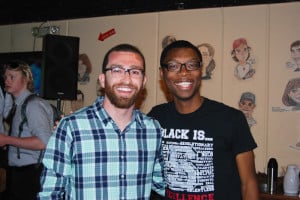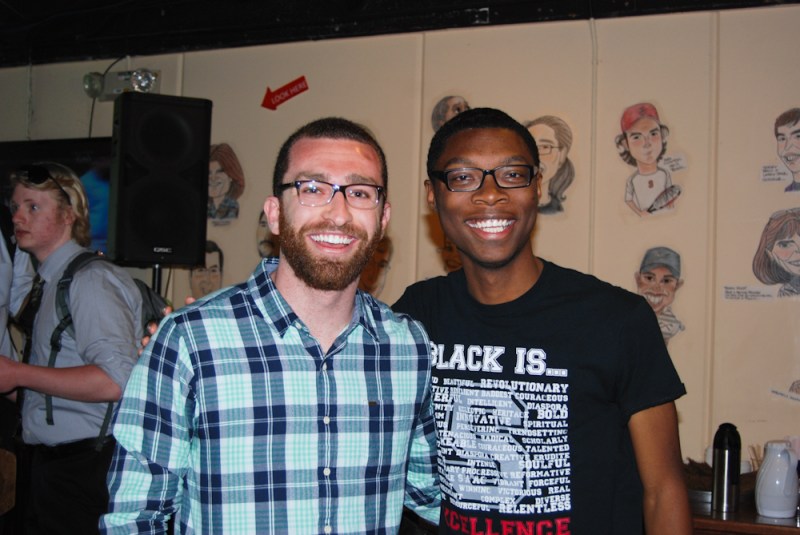Having assumed office after a heated campaign last spring, ASSU President Robbie Zimbroff ’12 M.A. ’13 and Vice President William Wagstaff ’12 M.A. ’13 are nearing the end of their time in office. With less than two months left in their term, Zimbroff and Wagstaff sat down with The Daily to discuss their time in office and what they still hope to accomplish.
The Stanford Daily (TSD): What were the main goals that you set out to accomplish as ASSU Executives, and do you feel that you were successful?
William Wagstaff (WW): We separated our platform into big ideas and more day-to-day stuff. Some of the bigger things were faster reimbursements from SSE [Stanford Student Enterprises], bringing food trucks and working with [the Sexual Assault and Relationship Abuse] office, and we wanted to do the textbook exchange, community centers and staff appreciation. I think we were successful.
Robbie Zimbroff (RZ): When we started out, we set our goals to be pretty realistic of what one could accomplish and should accomplish, but we also left room for things that come up in the middle of the year…one of the realities is [that] things take longer than you first imagine them to, so we are still trying to finish up and make sure that we tie up all loose ends.
TSD: If you had a chance to redo your term as Executives, is there anything that you would do differently?
RZ: There are specific instances where I would have tried to have a stricter timeline on when things got accomplished. The sexual assault relationship abuse stuff…has been a very long process that we started at the beginning of the fall, even over the summer, and still is frustratingly not complete…We are really trying to produce a singular document about what the pathways are, what the University responses are after an assault.
TSD: What is your response to critics who say that bringing food trucks to campus was your only accomplishment?
RZ: It’s our most public one…The nature of the way we have to communicate about that is different. Making SSE a little more efficient is not something that I have to tell you in a Facebook group…I don’t think we need to throw in your face all the time exactly what we are doing every week or toot our own horns for our own sake.
WW: I think the tailgate was also a pretty effective thing that reached a different crowd of people. More serious things like the sexual assault and relationship abuse stuff will touch a small number of people, but it’s also important to say that there were people who really enjoyed the tailgates. That is something that helped with our sports culture.
TSD: What do you think about the fact that only one slate has declared to run for Executives this year? How many people do you expect to declare?
RZ: To be honest, we haven’t been keeping a pulse on who has been declaring or not…I wonder how much it’s being advertised. I haven’t seen much being advertised about it, but I don’t keep very close tabs on lists and stuff, so I don’t know what is going to.
WW: I have no idea.
TSD: Why do you think that fewer and fewer students are voting in ASSU elections every year, and do you think this trend is concerning? Is there any way to reverse it?
RZ: I don’t put too much stock in reading the tea leaves of what voter turnout means. I think different years have had different levels of engagement…It will be interesting if people end up declaring if they start talking about Suites, which is a very relevant issue at the moment of elections, and if it becomes kind of a defining feature of the election cycle.
WW: It changes also with who runs. I don’t really think about it too much.
TSD: Considering the lack of student interest in the ASSU and the small number of candidates who run for positions, do you think that the Undergraduate Senate and [Graduate Student Council] accurately represent the student body as a whole?
WW: I don’t know that the expectation is that they are a perfect representation of the student body…I guess people took it upon themselves to run, and you have the right to exercise whether or not you are going to vote.
RZ: Clearly our school is not made up of 80 percent sophomores and 10 percent juniors, so it’s not representative in the exact distribution of what campus is. Does that mean that they can’t do what the ASSU needs to be doing? No, not at all…They fulfill a need to support other groups that is very important and needs to get done, and everything beyond that is sort of the year-to-year variation of…the students and what is going on on campus.
WW: If people really wanted something changed, and they thought student government could do something about it, I think those people could reach out to the Senate…If you don’t think they’re representative, then you should talk to them about what you want to do. Or run.
TSD: What will you be focusing on for the rest of your term?
RZ: I believe April 3 we are having a staff appreciation day, which is for all residential and dining staff…SARA stuff, we are trying to get our peer-to-peer panels into dorms so we have hired a coordinator, she has a long list of people who want to volunteer to be panelists…We’re working with club sports to reinstate scholarships that used to exist before budget cuts to help kids who can’t afford club dues to still be able to play club sports.

We’re expanding a reuse-recycle program with sustainability groups…we are basically going to pick up more refrigerators that are getting tossed at the end of the year and bring them back to campus so kids who might not be able to afford a fridge or microwave at the beginning of next year can get those.
WW: And not like super big but just for saving money, we’re trying to get the discounts out there more, people still miss them. Every time I go somewhere I ask if they have a student discount.
RZ: A lot of smaller stuff…the Community Action Board is an ASSU chartered organization and we have been working with them to start a grant program where different communities on campus can jointly run a program and get up to $500 for it…The idea is to get people into conversation about what diversity on this campus means and looks like…Not everyone needs to know about every little thing we’re doing all the time. Hopefully inside wherever you are on campus, we can try to help in some small way.
TSD: What is the most important lesson that you learned this year that you want to pass on to future Executives?
WW: Set hard deadlines…Be realistic. I think that yeah, there are a lot of things going on and a lot of issues student government can deal with, but there are also a lot of things that are really well done by the administration and by the University and also by student government.
RZ: It’s about knowing yourself and knowing what you always wanted to do or what you came there to do, because I think it’s easy to feel like you are in over your head if you are supposed to do everything that has ever happened on campus…Seeing that the ASSU is one part of the bigger picture, and not necessarily a more important part of the bigger picture, is a big leap that someone should take to be in this spot, but I think that people don’t always see that…Life is bigger than the ASSU, for sure, and if you are inside of it, it’s important to not lose sight of that fact and suddenly think that you’re extra tight because you are in the ASSU.
WW: Whatever you do, you are not going to make everyone happy. You are never going to be doing enough for people, sometimes you’ll be doing too much for people, sometimes you are not efficient enough for everyone, so you have to know that you can’t please everyone.
<@CEIt>This interview has been condensed and edited.
